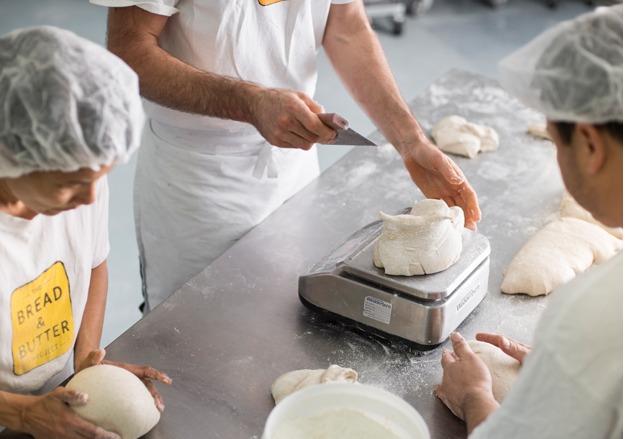Sometimes, a small encounter can moor you when you feel like you’ve been cast adrift. Bourke Street Bakery is that kind of place. The pocket-sized space may be heavy with delicious aromas, thanks to fall-apart lemon tarts encased in buttery pastry and heaven-sent rosemary sourdough, but its power lies less in baking prowess than in the way it replicates the thrill of coming home.
When I arrive to meet Paul Allam, who co-founded the business in 2004 and now oversees the Bread and Butter Project, a wholesale bakery dedicated to employing and empowering new refugees, it’s impossible not to recall that sensation. Conceived when Allam and his wife Jess took a trip to the Thai-Burmese border—where they taught Karen women how to bake bread and supply local businesses—the Bread and Butter Project is proof that homecomings can coincide with new beginnings. It also marks Allam’s transformation from soulful baker to social entrepreneur.
When you first stumbled on the original Bourke Street Bakery site did you have a strong vision for what you wanted it to be?
Bourke Street Bakery started when David [McGuinness] and I found that corner in Surry Hills and it grew organically from there. One thing we did know was that we wanted it to be about community. It’s the thing that made the original bakery successful. It’s a tiny community hub—people come in and we always know who they are.
Before that, I was a chef. I started when I left school and then moved to Prague and baked in cafes. It’s always been about food for me. The Bread and Butter Project is just another connection with food but in a way that I’d never experienced before.
In 2011, you took a trip to the Thai/Burmese border and taught Karen refugees to bake. How did that come about?
I received a random phone call from my uncle, whose friend was in contact with an orphanage in Mae Sot and asked whether I wanted to come over, set up a micro-bakery and teach women from the refugee camps how to bake and sell those goods in a nearby town. I went over with Jess, stayed for ten days, and taught fifteen women the stages of baking. Three of them went on to be employed at the orphanage.
That was the catalyst for the Bread and Butter Project. I thought to myself, “I’m not going to be able to run that from the other side of the world.” But when I returned, I wrote a few drafts about how I could replicate that concept in Sydney. And when I showed that to a lawyer friend, Sally McGeough, she said, “That’s social enterprise idiot!” [laughs].
How do you decide who you work with?
Right now, the Migrant Resources Centre is our main pool of employment, but before that, we spoke to almost every agency in New South Wales. Then the Department of Employment, Education and Workplace Relations gave us a grant, which allowed us to bring on a trainee support manager whose job it is to look after issues that arise with refugees. At the moment, we’ve got five trainees, from Burma, Thailand and Sierra Leone.
They’ve all said that our project has given them a sense of purpose. They’re incredibly good at what they do. For some people a job is just a job, but at Bourke Street a job is not just a job and at Bread and Butter, the money that they receive impacts their families.
Currently, it’s a yearlong traineeship after which we aim to find them sustainable employment, make sure they’re happy and help them navigate the Australian workplace. We also have tutors that come in once a week to improve literacy and numeracy. Mae and Som will be the first to finish and we’d love to see them come back as baker-trainees with the skills to understand cross-cultural communication.
And how has it helped you evolve?
The whole process has been an amazing learning curve for me as well as the five founding members. There’s also the challenge of understanding refugees and piecing together how trauma affects people. It’s very humbling to come into a workplace and see people who haven’t had a job before come into a workplace and really try.
What are your plans for the Bread and Butter Project?
At the moment, we have over 70 stockists across Sydney and we’re growing. The more bread we sell, the more trainees we can put on—all profits go back to the business and the public plays a role in expanding it. Jess and I also wrote a book, which combines trainee stories and baking recipes.
There’s something about bread that’s so universal, isn’t there?
There’s bread in every culture and you can build so many narratives around it. It’s one of those things that brings people together.
